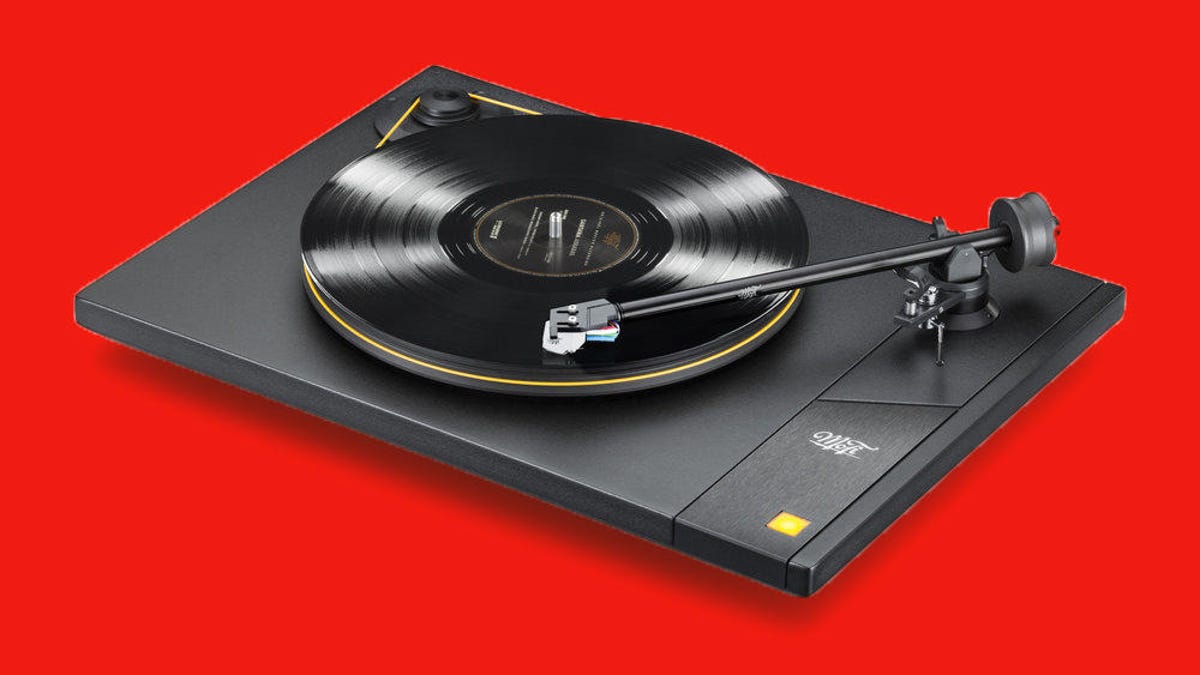This straight-up audiophile turntable costs less than you'd think
Looking to step up your vinyl game? The $999 MoFi StudioDeck looks, sounds and feels terrific -- and it’s made in the US.

The MoFi StudioDeck turntable.
While I rarely have a need to physically touch my speakers or digital converter, turntables are all about how they feel when you play a record. Vinyl is the most tactile of all music formats, so if the turntable feels awkward or cheap, playing music won't be much fun. Even before I listened to an LP, the MoFi StudioDeck turntable scored high on feel and design, it's a joy to use. Turns out it sounds good, too.
The MoFi StudioDeck is a belt-drive turntable with a medium-density fiberboard base which is embedded with a smidgen of aluminum inserts. On top sits a nicely machined Delrin platter that spins on an inverted bearing, and it's accompanied by a 10-inch aluminum tonearm that looks snazzy and feels solid. To accommodate the longer arm, the base is a little larger than average at 19.7 by 5.4 by 14.3 inches (500 by 137 by 363mm). The StudioDeck weighs a rather hefty 19.1 pounds (8.7kg) which is supported by four height-adjustable feet.
Read: Best turntables under $300
Black is the only available color, and I like the way the nicely finished plastic dustcover sets off the design. The StudioDeck doesn't use a wall wart or external power supply, the electronics are built-into the turntable's base.
The StudioDeck retails for $999, £995, and AU$1,599, my review sample was fitted with a MoFi StudioTracker moving-magnet phono cartridge, it's sold separately for $199, £199, or AU$299. The turntable and tonearm were designed and manufactured in the US.
After unboxing the StudioDeck setup is straightforward, just place the platter on the base's bearing, loop the belt around the motor pulley and the platter, put the tonearm's counterweight on the arm, hook up the stereo cables to your preamp or receiver's phono input and you're good to go. Takes about 10 minutes, if turntables are new to you the owner's manual does a good job illustrating the process. Even so, if you have an experienced turntable owner handy it wouldn't hurt to have them on call.
The StudioDeck's isolation from external knocks is above average, so my fist pounding on the shelf didn't disturb the turntable one bit. That's impressive, but my knock tests don't guarantee the StudioDeck will be totally immune from "needle" skipping if you have a bouncy wood floor.
MoFi also sent along their $249, £300, or AU$499 StudioPhono preamplifier. It easily sounded a lot better, clearer and more alive than our Rotel RA-1592 ($2,499, £1,895, AU$3,499) integrated amplifier's built-in phono preamp.
The MoFi StudioDeck turntable.
Listening
The StudioDeck's general composure was assured, very clean, clear, and it just went about its business of playing LPs without any hitches. Lesser turntables accentuate LP surface noise clicks and pops, the StudioDeck did not.
I was in a reggae mood when I started listening in earnest, and I went for the classics, like Sly and Robbie's King Tubby's Dance Hall Dub LP, and the beats were plenty deep. Listening at medium-high volume, the recording's dynamic kicks fully exercised our Pioneer Elite SP-EFS73 tower speakers.
Sasha Matson's Tight Lines LP is a lovely work for chamber orchestra, and the music's rich timbre revealed the StudioDeck's sophisticated side, the sound was gorgeous.
MoFi sent along its 45 RPM LP remastering of Miles Davis' Kind of Blue as well, a recording I know like the back of my hand. It's funny, I'm so used to hearing digital files in the CNET listening room, but here with the StudioDeck and the Davis' LP the equation changed. The sound was more flesh and blood natural, and the SP-EFS73 speakers never sounded like this before! They're even better than I thought!
I wish I could have sonically compared the StudioDeck to the Rega Planar 3 turntable ($945, £550, AU$1,199) I reviewed in 2016, but that turntable was returned to the importer. I definitely think the Planar 3's high gloss finish and glass platter are more attractive, but the StudioDeck's restrained styling should wear well over time. Looking deeper the StudioDeck's tonearm is more easily adjustable, so it will work with a wider range of phono cartridges than the Planar 3. The StudioDeck is also less sensitive to external bumps and shocks than I remember with the Planar 3. The StudioDeck has female RCA phono jacks on its rear side, so it's easy to install audiophile-grade cables, the Planar 3's cables are permanently attached, so you're stuck with what comes from the factory.
The Pro-Ject Classic SB ($1,499 and £1,350) is another turntable I recently reviewed in the StudioDeck's price class. The Classic SB is better looking and it's competitive with features. Again, I didn't have it on hand for a shoot-out, but I will say I preferred using the StudioDeck; it just felt better in my hands.
The MoFi StudioDeck has a lot going for it, but if you crave even higher performance, check out MoFi's $1,999, £1,995, AU$2,799 UltraDeck!

